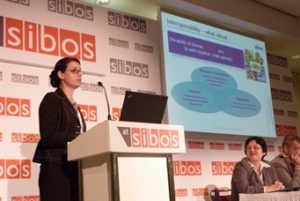We’re still here enjoying the Indian summer of Toronto, which would of course be even more pleasant from the outside, rather than from within the MTCC, but that’s another story.
Today was the big day – we hosted our “Financial interoperability and open source” community session moderated by Mrs Rodica Tuchila, Senior Advisor ARB (Romanian Banks Association).
We have put together a distinguished panel, bringing a complete range of opinions to the audience:
Rodica Tuchila, Senior Advisor, RBA (Romanian Banks Association)
Adriana Tanasoiu, CEO Depozitarul Central (Romanian CSD)
Laurentiu Andrei, Deputy General Manager, State Treasury and Public Debt Directorate, Romanian Ministry of Public Finance
Armin Gerhardt, CEO Efis
Corina Mihalache, Business Analyst, Allevo
After hearing the perspective of business customers and regulators, Corina Mihalache presented the vendor’s point of view. She started by defining interoperability as the ability of diverse systems and organizations to work together.
“Interoperability can only be achieved by an industry capable and willing to combine technology standards and innovation. This practical mix of standards and innovation will only succeed when delivered with business practices that are based on a balance of cooperation and competition.”
Craig Burton in Doc Searls’s A conversation with Craig Burton about business prospects for Linux
The financial industry confronts with drastic cuts and it still must keep pace with technology, it still needs resilient and performing systems, but most solutions are natively proprietary, thus very hard to be adapted outside of their scope. Also, the fact that payments have already become commodity is starting to be accepted by more and more people by the day.
We strongly believe that an open source platform will lead to the commoditization of the entire processing layer. And this can also be read as achieving interoperability in the financial world. This is the key message of Corina’s speech.
The modern day concept of Open Source is not a new idea at all, it’s been here for quite some time now. And it is not an unknown concept to banks either. In March 2011 Banca della Svizzera Italiana (BSI Bank) in Ticino, Switzerland chose to go open source, selecting the Magnolia (Basel, Switzerland) CMS as the backbone of its communication platform.
Why not make full benefit of it in the transaction processing layer as well?
Are we completely off track?
After the session, someone from the audience dropped by our booth and asked us something that translates to both “What an excellent idea, but are you out of your mind?”. Mmm, yes we might be. The whole purpose of this approach is to create an interactive space which will drive innovation both in the community of developers of financial applications and in the way financial institutions evaluate and purchase software. With open source a whole new perspective unfolds. Adopters can rely on:
– components reusability, lower ownership, maintenance & support cost
– usage of a practice proven stable product optimized for financial transactions processing
– ensure end to end interoperability & conformity with the EIF provisions
– growth potential due to rich expertise mixture.
More details about this session and the presentation itself are available in the Allevo Session page on our website or inside our Virtual Sibos booth (go check it out if registered on mysibos.com). If interested to find out more about this initiative please do not hesitate to contact any of us.
The 5 pm gig finished up with happy faces and smiles from our fine wine tasters and with a new set of winners of today’s draw:
By:












